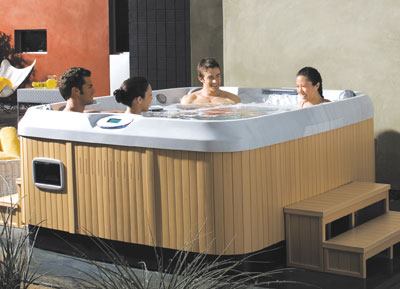The landscape of the hot tub market has shifted once more with Jacuzzi Group Worldwide’s purchase of competitor Dimension One Spas.
Details regarding the February acquisition are limited. However, in a general statement released last month, Jacuzzi confirmed that Dimension One will continue to operate as a separate entity, with most existing business remaining at its current site in Vista, Calif. As part of the plan, the firm now is named New Dimension One Spas.
“Dimension One Founder Bob Hallam has built a great brand known for premium products, distinct designs and innovative features, making [the company] a great fit with the Jacuzzi Group,” said Bob Rowan, president of Chino, Calif.-based Jacuzzi North America.
The sale of one hot tub manufacturer to another has been occurring on a more frequent basis, with several taking place during the recession; however, insiders are questioning the motives behind this latest transaction.
In fact, it is the second time in nine months that Jacuzzi has sparked conversation among competitors and dealers. In June 2012, the firm bought beleaguered ThermoSpas Hot Tub Products, a move that drew speculation from all corners of the industry.
Now, with this new purchase, some are wondering if the hot tub giant plans to follow the ThermoSpas model and sell directly to consumers. Officials at Jacuzzi and D1 declined to comment on their strategies by press time.
“No one can figure it out,” said Jeff Bailey, owner of Spring Dance Hot Tubs in West Berlin, N.J., and a board member of the International Hot Tub Association. “They clearly have a plan, but buying a premium spa brand doesn’t seem to fit. [If] you have three Mercedes in your garage, why buy a fourth? A lot of people are scratching their heads.”
Like the ThermoSpas purchase, some suggest this move is merely another opportunity too good to ignore. Others, however, said it may have been a means for D1 to exit the market before its dealer base became too low.
“D1 is a good brand with a good reputation,” said Bob Lauter, CEO of Fort Wayne, Ind.-based Master Spas.
“[But] there’s no question that when the bottom fell out, it seemed like D1 got hurt more partly because of how impacted California’s spa retailers were, and that was where a lot of D1 business was,” added Lauter who also is the IHTA president.
Notably missing from the Jacuzzi family of products was a swim spa line, an option that may have further sweetened the deal thanks to D1’s AquaFit System, which features four exercise models, Lauter said.
Others are less skeptical of the transaction, instead viewing it as a sign of the firm’s financial strength and forecast for the future.
“The fact that [Jacuzzi] is investing money is good because they think there is potential,” said Mario Alba, president of Des Moines, Iowa-based Central Iowa Pool & Spa and a board member of the Association of Pool & Spa Professionals’ Retailers Council. “They are a big company and want to gain more market share and help their bottom line.”
Meanwhile, current D1 dealers are anticipating how it will affect their operations.
“I will have to wait and see how it plays out,” said Rob Anderson, president of All Poolside Services in St. Paul, Minn. “Hopefully, they don’t bring more competition, but rather, more tools to help with the [D1] line.”
With little to go on, a few remain less focused on Jacuzzi’s agenda and more interested in additional fallout from the recession. The economy is slowly improving and as the hot tub sector rebounds, there may be further contraction before the new map of the land is completely formed.
“Many people have used up their resources to get through the recession and the question is, ‘How vulnerable are these companies now?’” Bailey asked.
Founded by Hallam in 1977 as a retail store, D1 grew to become a manufacturer of hot tubs and aquatic fitness systems.
Jacuzzi began as a pump manufacturer in 1925 and today produces hot tubs, bathtubs, walk-in bathtubs, showers and sinks.




